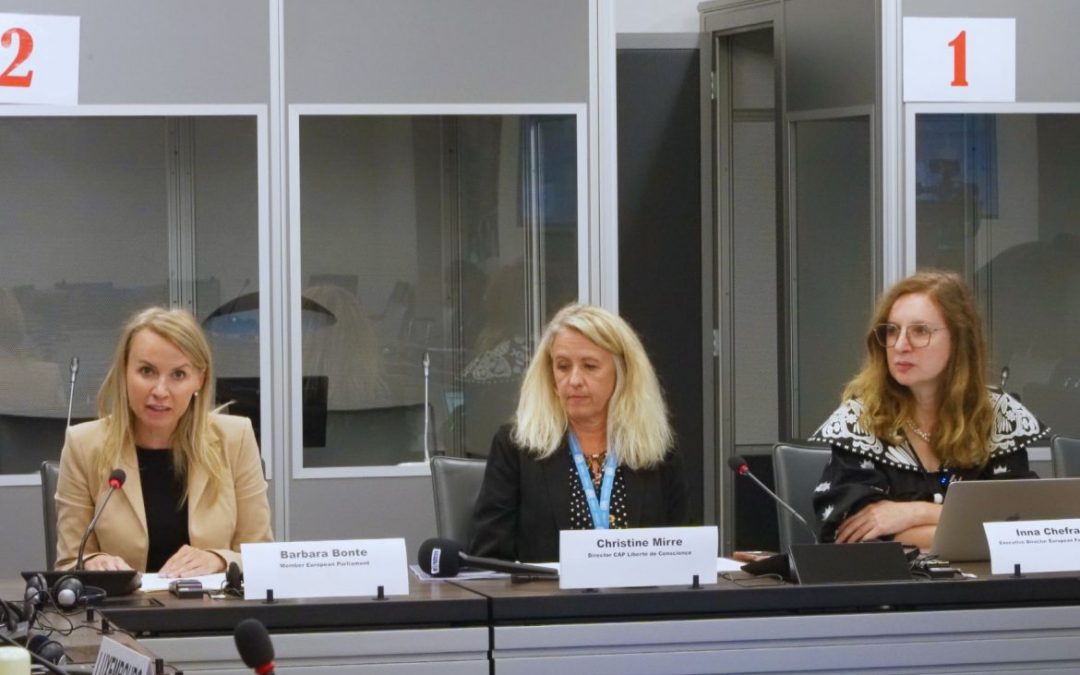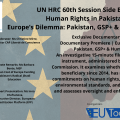written by Gary Cartwright October 2, 2025
A side event at the UN Human Rights Council’s 60th session (UNHRC60) in Geneva urged the Council’s mechanisms to place structured pressure on the European Commission to apply the EU’s Generalised Scheme of Preferences Plus (GSP+) as written, using six procedural steps outlined by Inna Chefranova of the European Facilitation Platform (EFP).
Hosted by CAP Liberté de Conscience and co-organised with EU Today and EFP, the meeting combined a keynote by MEP Barbara Bonte with an expert briefing and the premiere of the documentary GSP+: The EU’s Silent Compromise.
Investment opportunities Europe
The organisers stated their objective plainly: to align UN outputs with the EU’s enforcement track so that conditionality attached to GSP+—effective implementation of 27 UN and ILO conventions—can be verified against short, time-bound benchmarks. The focus was on protections for people at risk, including women and girls, religious minorities, workers, journalists and families of the disappeared.
pening the session, Barbara Bonte framed the discussion in the context of education indicators and regulatory leverage. “Education is the backbone of every society… When that foundation is strong, nations thrive. When it is weak, they stumble. In Pakistan, that foundation is cracking,” she said, linking decades of underfunding and politicisation to the growth of religious seminaries (madrasas) with uneven oversight. Bonte cited figures presented at the event: public education spending “around 0.8% of GDP” for 2024–25, estimates of “more than 30,000” madrasas with roughly “18,000” registered, and literacy “around 60%”. “Teachers report… many students cannot locate Pakistan on a world map,” she noted, adding that curricula focused almost entirely on doctrine restrict employability.
Turning to conditionality, Bonte argued that the EU’s trade instrument should be used when outcomes fall short. “Suspending GSP+ is not about punishment for its own sake. It is a tool to create leverage for change,” she said. “Education should be the path out of poverty, not the path into hatred.” She referenced the Commission’s 2024 temporary suspension of tariff preferences for ethanol from Pakistan on “serious market disturbance” grounds as an example of corrective action when a legal threshold is met. Prepared materials also pointed to Commission correspondence acknowledging that EU funds reach “seminary institutions” in the education sector. Bonte concluded: “The European Commission now stands at a crossroads… My call is clear: suspend Pakistan’s GSP+ trade privileges until the country meets its commitments on human rights, minority protection and genuine educational reform… The time to act is now.”
In her expert presentation, Inna Chefranova set out the route for UNHRC to press the European Commission lawfully and efficiently. “GSP+ is not a gift. It is a contract. It links tariff preferences to the effective implementation—not just ratification—of 27 UN and ILO conventions,” she said. While noting that the UN cannot itself withdraw trade preferences, Chefranova stressed its evidentiary role: “The UN cannot, by itself, change trade policy. But it can remove ambiguity. It can put the facts in the right format, at the right time, in front of the body that does have the mechanism. The GSP+ Regulation expressly allows the Commission to act on UN and ILO findings.”
Chefranova then detailed six steps for UN follow-up designed to translate existing UN records into EU-usable benchmarks:
- An OHCHR-compiled dossier of UN treaty body conclusions and ILO supervisory opinions on Pakistan, mapped to the 27 conventions and framed as outcome-based benchmarks verifiable within six months (e.g., criminalising and investigating enforced disappearances; prosecutions in emblematic bonded- and child-labour cases; operational safeguards to prevent abuse of blasphemy provisions; verified registration of independent trade unions in export sectors). The dossier should be transmitted formally to the European Commission and the European External Action Service.
- A joint Special Procedures communication to Pakistan setting the same benchmarks and timelines, with the text shared with the Commission for information.
- Mirroring benchmarks in the Universal Periodic Review (UPR) so that progress— or the absence of progress— is visible within any GSP+ monitoring window.
- Technical briefings with EU officials (during the current or next Council session) on triggers for a notice of investigation, the weight accorded to UN/ILO sources, the six-month monitoring stage and options for partial suspension.
- Prioritised tracking of reprisals and trial monitoring in cases linked to the benchmarks, publishing short updates during the six-month period.
- An explicit corrective pathway, clarifying that any temporary withdrawal under GSP+ is reversible upon verified delivery: “Notice—six months—decision. Results lead to reinstatement,” Chefranova said.
The documentary GSP+: The EU’s Silent Compromise placed decisions taken in Brussels alongside reported outcomes on the ground, and included an estimate of €55–€60 billion in cumulative EU preferential imports from Pakistan over 2014–23. The film asked whether these advantages have been matched by measurable improvements for vulnerable groups.
The human impact was underscored by a recorded plea from Mihal, daughter of Shagufta Kiran, reportedly on death row under Pakistan’s blasphemy law: “My mother has been sentenced to death… Please help us. We urgently need your support to save my mother’s life.” Chefranova closed by linking the testimony to the proposed pathway: “Let us match this plea with action… a UN dossier, six-month benchmarks, and use of the GSP+ mechanism as written.”
 Printed materials at the event included a short brochure and a white paper mapping UN and ILO findings, as well as EU monitoring, to the thresholds in the GSP+ Regulation. A QR link to documentation was provided at the close. The organisers said the six-step approach does not create new mandates or budget lines; it organises existing UN tools so that the Commission receives a single, benchmarked, time-bound record aligned to the Regulation’s criteria.
Printed materials at the event included a short brochure and a white paper mapping UN and ILO findings, as well as EU monitoring, to the thresholds in the GSP+ Regulation. A QR link to documentation was provided at the close. The organisers said the six-step approach does not create new mandates or budget lines; it organises existing UN tools so that the Commission receives a single, benchmarked, time-bound record aligned to the Regulation’s criteria.
More :
EU Lawmakers Push to Suspend Pakistan’s GSP+ Over Religious Extremism, Human Rights Violations
Geneva: European lawmakers, experts call to suspend Pakistan’s GSP+ over human rights abuses
Vidéo ani :
https://www.youtube.com/watch?v=U6-ksAD1foQ
Video side-event :
UNHRC60 Side Event. Europe’s Dilemma: Pakistan, GSP+ and Human Rights.
https://www.youtube.com/watch?v=UrCvuXk0WPE
Barbara Bonte MEP at UN HRC60 — Education in Pakistan: reform, radicalisation, and EU leverage
https://www.youtube.com/watch?v=EtgjHXBPBxE
Europe’s Dilemma – Scrutiny Over Pakistan’s GSP+ Status at UN Human Rights Council 60th Session
https://www.youtube.com/watch?v=voByfWSIJxU
Eu Today :
UNHRC60 side event urges UN to press European Commission on GSP+ enforcement in Pakistan





